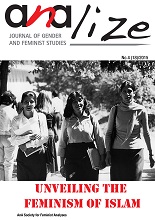»Reverence the Wombs that bore You«: On Unearthing a Female Legacy Transgressive to the Patriarchal Social Order
»Reverence the Wombs that bore You«: On Unearthing a Female Legacy Transgressive to the Patriarchal Social Order
Author(s): Nahida S. NisaSubject(s): Gender Studies, Islam studies, Social Norms / Social Control
Published by: Societatea de Analize Feministe AnA
Keywords: Islamic feminism; Quran 4:34; Unseen; male scholarship; women’s agency;
Summary/Abstract: Perceptions of women’s power and authority in Islam range from Orientalist discourses that present the Muslim woman as an exotic, victimized, and elusive figure in need of reform, to patriarchal scholarships that confine her to a secondary, consequential role under male regulation, to Islamic feminist exegeses that seek to liberate her, and itself, from either of these assessments. This study explores the flaws in contemporary patriarchal male scholarship, referred to herein as “patriarchal scholarship” or simply “male scholarship,” and defined as the line of scholarship that claims traditional precedent and mainstream consensus, that necessitate Islamic feminism. I build on Asma Barlas’s observation that while male scholarship professes egalitarianism in Islam by upholding Qur’anic values of equality at a theoretical, spiritual level, this profession is duplicitous, as patriarchal scholarship simultaneously fails to apply its Islamic theory of egalitarianism to Islamic practice, which should be challenged as a detrimental lapse in logic. My argument consists of three elements: I assert that inconsistencies between Islamic belief and Islamic practice as promoted by patriarchal scholarship prevail at even the interpretational level, that this male legacy of interpretative authority is afforded a continuity that female scholarship is denied, and that the formations of Islamic feminist exegeses predate European colonial influences in the Middle East. It is this third point that renders disingenuous the characterization of Islamic feminism as non-traditional compared to patriarchal scholarship, and subsequently an insufficient reason to dismiss feminist scholarship, though it is one commonly employed and further facilitated by the harmful dynamics of Orientalist discourse that seek to “free” the Muslim woman over her agency.
Journal: AnALize: Revista de studii feministe
- Issue Year: 2015
- Issue No: 4 (18)
- Page Range: 58-75
- Page Count: 18
- Language: English

